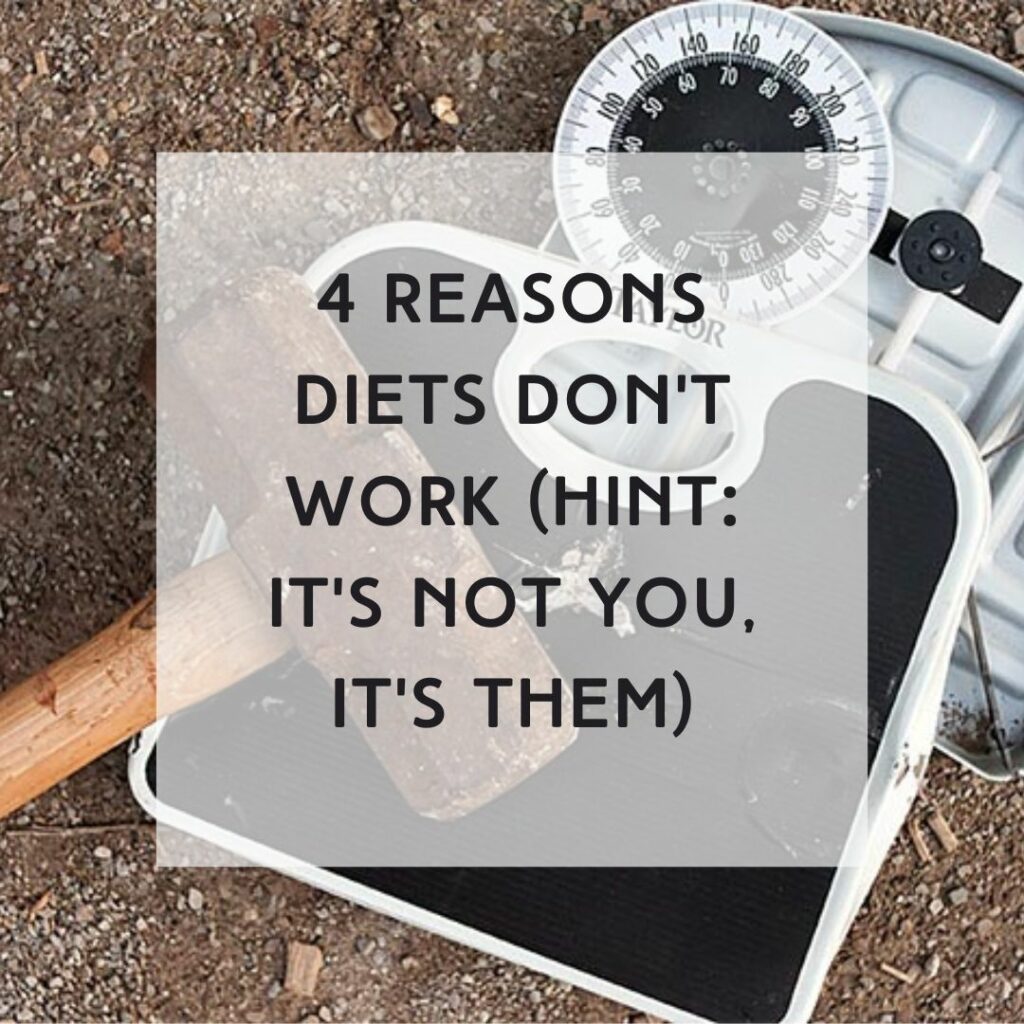
We are bombarded by advertising and media all throughout the year that push the idea of restriction and dieting as the means to being fit and healthy. As a result, we are virtually programmed to follow suit. The diet, health, and fitness industries are multibillion dollar industries that prey and profit from this idea year after year. In fact, the diet industry rakes in over $70 billion annually doing just that.
What if though, you bucked the norm and decided not to fall prey and follow along blindly? I know it can seem like a revolutionary decision because for many of us it’s just what we do. There doesn’t seem to be any other path. Well, I am here to tell you that there absolutely 100% is, and understanding the impacts of diets on our minds and bodies is the first step.
Here are 4 reasons to rethink your goals around dieting and weight loss.
1. Dieting and Restriction Doesn’t Work Long Term
I hear from clients all the time that this or that diet worked for them, but when we delve in a little further what comes up time after time is that the diet may have worked temporarily, but did not in the long term. The weight lost is regained, plus some, leaving people feeling like they have failed when in actuality they were destined to fail from the get go. Not because of their lack of willpower, but because our bodies are super intelligent beings that don’t like starvation – we’ll go more into that in a bit.
There isn’t just anecdotal evidence to support the fact that diets don’t work long term, scientific evidence finds the same results. Somewhere around 95-97% of people who lose weight through dieting and restriction gain it back within 1-5 years. Diet researchers are well aware of these dismal statistics. One diet researcher was quoted to say, “it is only the rate of weight regain, not the fact of weight regain that appears to be open to debate.”
Keep reading to find out why it’s the diets that fail, not you.
2. Dieting Feels Like Famine and Starvation and Your Body and Mind Rebel
Although we blame ourselves when diets don’t work, it is less about self-control and willpower and more about biology and physiology. When you restrict food, which often times means eating fewer calories than your body requires, your body kicks into primal survival mode. It doesn’t like being in diet mode and doesn’t know it is being put there on purpose and so it fights back. Biological and psychological forces are ignited that make maintaining lost weight really hard and regaining lost weight really easy. Changes in brain chemistry, hormone levels, metabolism, and psychology all fight against what it perceives as famine.
Brain chemistry
When you are dieting your brain actually responds differently to yummy looking food than it does when you aren’t dieting. In diet mode, certain areas of the brain are activated that make you more likely to notice food and find it more enticing. In addition, the abilities of your prefrontal cortex, which is a part of your brain responsible for resisting impulses and making decisions, are reduced. When you put these two responses together it is very clear why resisting food, especially off-limits food, becomes such an all-out battle when we are on a diet.
Hormones
As you diet and weight comes off, you also lose body fat. Our body fat produces hormones that are intricately involved in functions of the body, such as feelings of hunger and fullness. As we lose body fat, levels of varying hormones change. The levels of hormones that send messages of feelings of fullness – leptin, peptide YY, and cholecystokinin – decrease. The levels of hormones that make you feel hungry – ghrelin, gastric inhibitory peptide, and pancreatic polypeptide- increase. Ultimately these hormone changes increase your urge to eat at a physiological level.
Metabolism
When there isn’t enough food coming in and therefore calories (your body’s source of fuel) your metabolism slows down to conserve energy. Your body becomes super-efficient at using calories, which allows your body to run on even fewer calories. That may sound like a good thing, but ot actually isn’t. More calories are left unused and can be stored as fat. A perfect example of these metabolic results after weight loss is the Biggest Loser study. Researchers studied 14 of the contestants who had participated in the Biggest Loser TV show six years after the competition and found that not only had all but one of the contestants regained their weight, but that their metabolism had slowed dramatically, resulting in their bodies requiring even less calories to do the same amount of work.
Psychology
When people are dieting and hungry, psychological changes also kick into action. A ground-breaking study conducted in the 1940’s, called the Minnesota Starvation Experiment, showed just how impactful a lack of appropriate fuel can be on our psyche. The study was done by Ancel Keys, a professor at the School of Public Health at the University of Minnesota. Thirty-six men volunteered to have their calories limited so that researchers could better understand the impact of starvation on the body and mind. These thirty-six men were chosen out of four hundred because they were the most physically fit and mentally sound. For the first three months they were fed 3,200 calories – a normal amount for active, grown men. Then for six months their calories were cut in half to 1,570 calories per day. The impact of their calorie restricted diet on their overall health and especially their mental health was profound.
Physically the men became gaunt and their strength, stamina, and sex drive all decreased. Most notable though was the psychological impact. The men became obsessed and completely preoccupied with food. Prior to the study the men had many interests, but after their calories were restricted their main focus was on food and eating. They talked about food, they dreamed about food, and their thoughts were largely on their meals and plans for eating in the future.
Men who had never cooked before or had any interest in cooking started clipping recipes and collecting cookbooks and several of the volunteers vowed to take up careers in the food industry when the study ended. The men’s moods were also impacted becoming more irritable, anxious, depressed, apathetic, and withdrawn. They even developed distorted body image. Despite losing significant weight and their near skeletal appearance most of the men did not see themselves as underweight.
I could go on and on with the varying psychological impacts these men encountered due to their lack of calories. If you are interested, look it up and read more about it. To me this study is a fascinating example of what happens when our bodies are deprived of calories. Some of the behaviors of these men are not unlike the experiences I hear from clients who have dieted for many years. The mind is a powerful thing.
3. Dieting Actually Increases Your Likelihood of Gaining More Weight
What if the doctor prescribed you a medicine that was known to only work 5% of the time, or would only help you temporarily and in the long run would actually worsen symptoms? Would you take it? Would you start another diet if you knew with almost near certainty that it would cause you to gain more weight? This is a hard one to swallow I think for most people, but if you are someone who has been on many diets and seen the scale go down just to go back up again maybe you can relate. Again, the evidence that this is true is not just just hearsay, it has been shown time and again in multiple studies. Here are a few…
- A team of UCLA researchers reviewed thirty-one long-term studies on dieting and concluded that dieting is a consistent predictor of weight gain”up to two-thirds of the people regained more weight than they lost (Mann, et al, 2007).
- Research on nearly seventeen thousand kids ages nine to fourteen years old concluded, - in the long term, dieting to control weight is not only ineffective, it may actually promote weight gain (Field et al. 2003).
- Teenage dieters had twice the risk of becoming overweight, compared to non-dieting teens, according to a five-year study (Neumark-Sztainer et al. 2006). Notably, at baseline, the dieters did not weigh more than their non-dieting peers. This is an important detail, because if the dieters weighed more it would be a confounding factor (which would implicate other factors, rather than dieting, such as genetics).
- A novel study on over 2,000 sets of twins from Finland, aged 16 to 25 years old showed that dieting itself, independent of genetics, is significantly associated with accelerated weight gain and increased risk of becoming overweight (Pietilaineet et al. 2011).
We also know that weight loss and weight regain, called yo-yo dieting or weight cycling, and dieting in general can actually be harmful to both our physical and mental wellbeing. Some of the negative health effects include: increased risk of heart disease, type 2 diabetes, and high blood pressure, long-lasting negative impacts on metabolism, inflammation, increased levels of the stress hormone cortisol (which alone has been linked to increased risk of type 2 diabetes and heart disease, weight gain, suppressed immune system, and digestive issues), and increased risk for disordered eating and eating disorders.
4. You Don’t Have to Lose Weight to Be Healthy
Despite what we think we know to be true and what diet culture and the diet industry will have us believe, you don’t have to be skinny or even lose weight necessarily to be healthy. How is that possible, you ask, when everywhere we turn this is the message we hear? A growing body of research is coming to light that questions this paradigm of higher weight = ill health. In our current weight-focused paradigm we make the assumption that people who weigh more are automatically less healthy and suffer from more diseases and that weight loss equals health. Without question. But what if this assumption is wrong?
Fortunately our assumptions around weight and health are being questioned more and more by researchers who are finding that what we take to be absolute truth is flawed. This new paradigm shift finds that taking the focus off of weight and on to health behaviors is far more beneficial to our health.
Think about it, when your main overarching goal is to see the scale go down what do you do? You may decide to eat more veggies, eat a better breakfast, move more, and change your habits in other varying ways…all good things. But if you are like so many, if these changes don’t result in the scale going down then you deem them not to be “working” and quit these healthy behaviors. If you kick the scale to the curb though, your whole perspective changes and you have the opportunity to embrace these healthy changes that are inherently beneficial “Weight Science: Evaluating the Evidence for a Paradigm Shift” You can find it online.
These points I’ve raised are really just the tip of the iceberg when it comes to rethinking our beliefs about what is best for our health. If all of this makes sense but you wonder if not diets, then what? Check out my blog If I’m Not Dieting and Focusing on Weight, What Do I Do? A couple of really great books on this topic if you are interested in reading more are: Secrets from the Eating Lab by Traci Mann and Body Respect by Linda Bacon and Lucy Aphramor. If you are interested in learning more and coming up with strategies to improve your health that are sustainable, I am here to help.

0 Comments